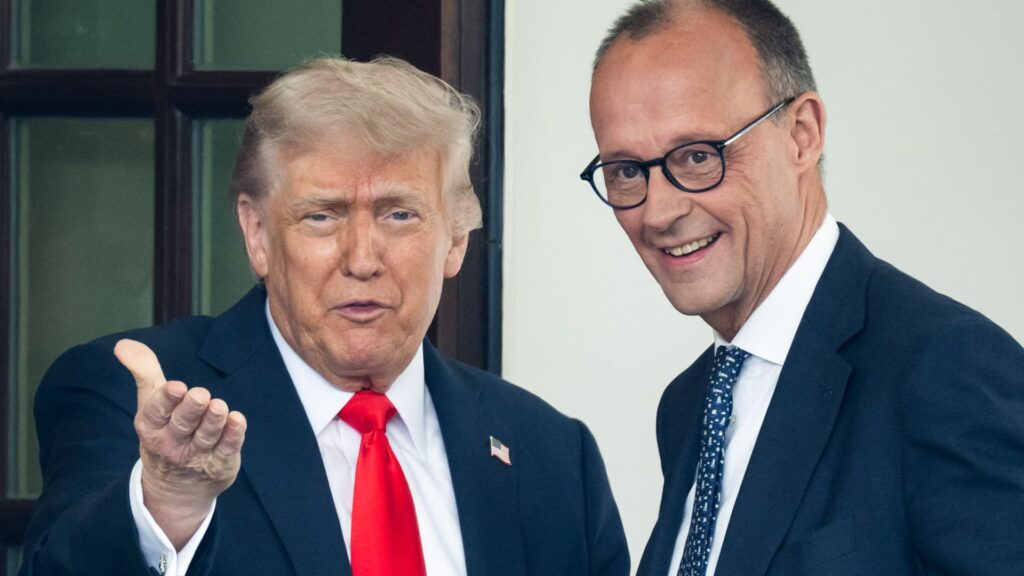President Donald Trump gestures toward the press as he greets German Chancellor Friedrich Merz upon arrival at the West Wing of the White House in Washington, DC, on June 5, 2025.
Saul Loeb | Afp | Getty Images
German Chancellor Friedrich Merz’s meeting with U.S. President Donald Trump was dramatically overshadowed by the U.S. leader’s spat with Elon Musk. But it was still seen as a win for Merz.
“Being sidelined is not necessarily always a bad thing,” Carsten Brzeski, global head of macro at ING, told CNBC on Friday. “In fact, it might have even helped Merz as the Musk distraction was also deviating attention away from more controversial topics.”
It was a high-stakes trip for Merz, who is just a few weeks into his chancellorship, especially given the treatment other leaders have gotten from Trump in the Oval Office in recent months.
As such, Merz is unlikely to be disappointed about the outcome — especially given the potential downsides.
“Having avoided an escalation in the Oval Office is already an achievement these days,” Brzeski added.
A full agenda
Merz arrived in Washington with a full agenda that ranged from strengthening relations between the U.S. and Germany, to tariffs — which could significantly impact key German industries — as well as U.S. support for Ukraine in its war with Russia and higher NATO defense spending.
While we don’t know what was discussed behind closed doors, Merz was seemingly able to address most of these points with Trump, political strategist Julius van de Laar told CNBC’s “Squawk Box Europe” on Friday.

“I think what Friedrich Merz got across is that he hopes that the U.S. president will continue to support Ukraine,” he said, noting that the issue had gathered momentum recently given several significant attacks. Merz was able to pick up on this, and draw links to the anniversary of D-Day a day after their meeting.
“And he said the United States played a great role in … freeing Europe from the Nazi regime back then, and so he’s hoping that Donald Trump will … say we’re going to get engaged again and help Europe become free of dictatorship,” van de Laar said.
Merz making this point was important in the context of highlighting the U.S.-German relationship, according to Jackson Janes, senior resident fellow at the German Marshall Fund. Speaking to CNBC’s “Squawk Box Europe,” he also pointed out that Trump was gifted his grandfather’s birth certificate by Merz, “making the point ‘you have a relationship with Germany in your own family.'”
German Chancellor Friedrich Merz presents US President Donald Trump with what Merz said was the birth certificate of Trump’s grandfather, who was born in 1869, during a bilateral meeting in the Oval Office of the White House in Washington, DC, on June 5, 2025.
Brendan Smialowski | Afp | Getty Images
Janes also noted that Merz highlighting Germany’s plans for higher defense spending would have marked a positive note in the discussion.
Germany recently changed its fiscal rules to allow for higher defense spending, and Merz’s government seems to be making it a priority. The chancellor has promised a financial push to boost the German military, and the country’s foreign minister has suggested support for Trump’s proposal that NATO members spend 5% of their gross domestic product on defense.

Meanwhile, the sensitive topic of Germany’s far-right party, the Alternative fuer Deutschland, was seemingly avoided. Officials in the Trump administration have in recent weeks come out in support of the party after German intelligence services classified it as a “proven right-wing extremist organization.”
This led to clapbacks from German politicians, with Merz himself warning the U.S. not to get involved. The classification of the AfD is currently on hold amid a legal challenge.
‘A home run’ for Merz
All in all, Merz’s visit to D.C. was seen as “a home run or a hole in one,” van de Laar said.
ING’s Brzeski also suggested that the trip laid good foundations between the leaders. “There seems to be some common grounds between Trump and Merz, which could be the seeds for a more constructive relationship,” he said.
Merz even appeared to get some compliments from Trump, with the president commending him for his English skills and saying that while “difficult,” the German leader was a “very good man to deal with.”
Following the meeting, Merz appeared satisfied, saying in a social media post that the atmosphere was “really good,” and that the two have much in common. “I am coming back with the feeling that we can speak on the phone any time,” he said, according to a CNBC translation.
But even an in-person reunion might not be too far off: a Trump trip to Berlin is already being planned, Merz told German media.

